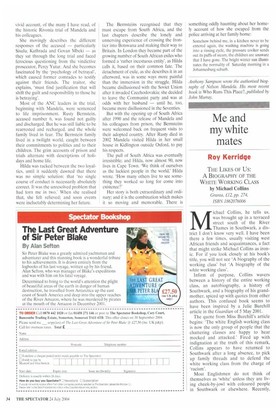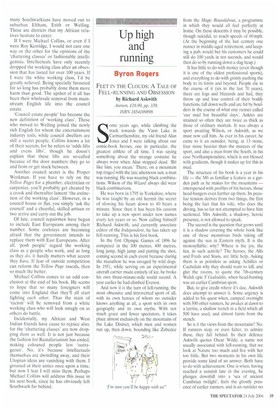Me and my white mates
Roy Kerridge
THE LIKES OF US: A BIOGRAPHY OF THE WHITE WORKING CLASS by Michael Collins Granta, £12, pp. 274, ISBN 1862076006 michael Collins, he tells us, was brought up in a terraced street south of the River Thames in Southwark, a district I don't know very well. I have been there a few times, usually visiting west African friends and acquaintances, a fact that might strike Michael Collins as ironic. For if you look closely at his book's title, you will not see 'A biography of the working class' but 'A biography of the white working class'. Infirm of purpose, Collins wavers between a history of the entire working class, an autobiography, a history of Southwark, and a biography of his grandmother, spiced up with quotes from other authors. This confused book seems to have been inspired by a Julie Burchill article in the Guardian of 5 May 2001.
The quote from Miss Burchill's article begins: 'The white English working class is now the only group of people that the chattering classes are happy to hear mocked and attacked.' Fired up with indignation at the truth of this remark, Collins appears to have returned to Southwark after a long absence, to pick up family threads and to defend the white working class from the charge of 'racism'.
Most Englishmen do not think of themselves as 'white' unless they are living cheek-by-jowl with coloured people in Southwark or elsewhere. Recently,
many Southwarkians have moved out to suburban Eltham, Erith or Welling. These are districts that my African relatives hesitate to enter.
If! were Michael Collins, or even if I were Roy Kerridge. I would not care one way or the other for the opinions of the 'chattering classes' or fashionable intelligentsia. Intellectuals have only recently dropped the working class after an obsession that has lasted for over 100 years. If I were the white working class, I'd be greatly relieved. Being specially favoured for so long has probably done them more harm than good. The upshot of it all has been their wholesale removal from mainstream English life into the council estate.
'Council estate people' has become the new definition of 'working class'. Those who moved to Welling joined the newly rich English for whom the entertainment industry toils, while council dwellers are still a secret people. Collins knows a lot of their secrets, for he refers to 'odds lifts and evens lifts', though he doesn't explain that these lifts are so-called because of the door numbers they go to and from or get stuck between.
Another council secret is the Proper Workman. If you have to rely on the Yellow Pages for a plumber, electrician or carpenter, you'll probably get cheated by a crook and thereafter lament 'the extinction of the working class'. However, in a council house or flat, you simply 'ask the council' and a cheerful, skilled artisan or two arrive and carry out the job.
Of late, council repairmen have begun to include East Europeans among their number. Some cockneys are becoming afraid that the government intends to replace them with East Europeans. After all, 'posh people' regard the working class as a people who work, and as long as they do, it hardly matters what accent they have. If fear of outside competition can reform the Yellow Page rascals, then so much the better.
Michael Collins comes to an odd conclusion at the end of his book. He seems to hope that so many foreigners will come into England that they'll all start fighting each other. Thus the stain of 'racism' will be removed from a white working class who will look smugly on as others do battle.
Incidentally, my African and West Indian friends have cause to rejoice also, for the 'chattering classes' are now dropping them as well. It is not just because the fashion for Rastafarianism has ended, making coloured people less 'outrageous'. No, it's because intellectuals themselves are dwindling away, and their Utopian ideas are vanishing with them. I groaned at their antics once upon a time, but now I fear I will miss them. Perhaps Michael Collins will address this issue in his next book, since he has obviously left Southwark far behind.



























































 Previous page
Previous page